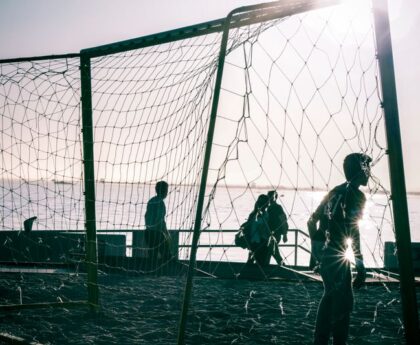## H3: Introduction
In a recent football match held in Romania, the game was brought to a halt by a group of Romanian fans who chanted slogans declaring “Kosovo is Serbia.” This incident has ignited controversy and raised concerns about discriminatory behavior in football. The encounter, which took place during a UEFA Champions League match, highlighted the complexities surrounding national identity and territorial disputes, as well as the responsibility of football organizations in tackling discrimination.
## H3: Football as a Reflection of Society
Football, often dubbed the “beautiful game,” has always been a platform for national pride and cultural identity. However, it also has the power to magnify the social divisions and conflicts that exist within and between nations. The incident involving Romanian fans chanting “Kosovo is Serbia” is an example of how football can inadvertently become entangled in political controversies.
## H4: The Kosovo-Serbia Conflict
Kosovo and Serbia have been embroiled in a long-standing territorial dispute. Following the breakup of Yugoslavia in the 1990s, Kosovo declared independence in 2008, a move not recognized by Serbia. This disagreement has resulted in tensions and territorial disputes, with Kosovo seeking recognition as an independent nation on the international stage.
## H4: Discriminatory Behavior in Football
Football matches have, unfortunately, become recurring venues for discriminatory behavior. Fans have used the sport as an opportunity to express unacceptable sentiments, such as racism, xenophobia, and nationalism. This behavior has marred the reputation of football worldwide and highlights the need for sports organizations to take strong measures against discrimination.
## H3: UEFA’s Responsibility
As the governing body of European football, UEFA has a crucial role to play in addressing discriminatory behavior. It is essential for them to actively enforce regulations against any actions that promote hate speech or nationalism within the context of football matches. Additionally, stricter penalties should be implemented for teams whose fans engage in discriminatory behavior, including fines, point deductions, and stadium bans.
## H3: The Role of Fans
Football fans also have a responsibility to create an inclusive and welcoming environment during matches. While passionate support is a fundamental aspect of the game, it should not manifest as hateful or discriminatory behavior. Fans must be cognizant of the impact their actions can have on the players, opposing fans, and the wider public. Football matches should be celebrated as a moment of unity, where differences are put aside, and the game is enjoyed for its intrinsic values.
## H4: Educating & Raising Awareness
Education plays a vital role in combating discrimination in football. Clubs and football organizations should invest in initiatives aimed at raising awareness about diversity, tolerance, and respect. This could include educational programs in schools, seminars for fans, and mandatory anti-discrimination training for players and staff. By cultivating a culture of inclusivity, football can become a force for social change.
## H4: Media Coverage & Public Opinion
The media plays a significant role in shaping public opinion and influencing societal attitudes towards discrimination. Responsible and ethical reporting of football events can help eradicate discriminatory behavior in the sport. Covering incidents such as the one involving Romanian fans should prompt critical discussions about the underlying issues and foster collective efforts to address discrimination in football.
## H3: Conclusion
The incident during the UEFA Champions League match, where Romanian fans chanted “Kosovo is Serbia,” serves as a reminder of the challenges faced by football in its pursuit of fairness, inclusivity, and respect. While it is essential to acknowledge the complexities surrounding national identity and territorial disputes, it is equally important to firmly oppose any form of discrimination in the sport.
Football organizations, particularly UEFA, must take stronger action against discriminatory behavior by enforcing regulations and implementing stricter penalties. Simultaneously, fans have a vital role to play in creating an inclusive and welcoming atmosphere during matches.
By investing in education, raising awareness, and promoting responsible media coverage, football can be a catalyst for positive change. It has the potential to transcend differences and unite individuals from diverse backgrounds through the common love for the game.
In a society grappling with numerous challenges, it is essential to utilize football‘s immense popularity to promote unity, respect, and understanding. Only then can we truly appreciate the beauty of the game and its ability to bring people together, regardless of their differences.

<< photo by Jermaine Ulinwa >>
The image is for illustrative purposes only and does not depict the actual situation.
You might want to read !
- Analyzing the Favorites and Making Predictions for the 2023-24 UEFA Champions League: Matchday Insights
- Understanding the Phenomenon: Tottenham’s Un-Spursy Ascendancy and Manchester’s Disarray
- The Rise and Impact of Dr. Uchenna Okoye: A Trailblazing TV Dentist
- Exploring the Impact of UEFA Europa League Fixtures on European Football
- Exploring Ryan Kent’s highly anticipated move to European giants in new title: “Former Rangers star Ryan Kent seals transfer to European football heavyweight”
- UEFA Champions League Draw: Schedule and How to Watch
- The Ultimate Guide to Buying UEFA Champions League Tickets: Pricing, Teams, and More




